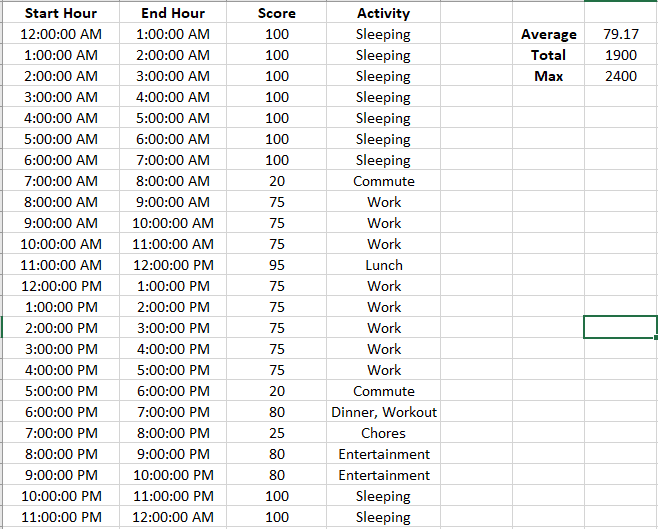“Money doesn't buy happiness.“
It's one of the often repeated phrases in personal finance (second only to “spend less than you earn!”).

There are studies that show you aren't happier when you make more money after a certain point. A Gallup survey of 450,000 Americans in 2008 and 2009 showed that “day to day contentment” rises with higher incomes but plateaus at $75,000. Make more money and it has no impact on your day to day contentment (but your overall life assessment happiness does improve).
As it turns out, there's a new study and there is a way you can buy day to day contentment.
“Buying time promotes happiness” is the title of a paper authored by Ashley V. Whillans (Harvard Business), Elizabeth W. Dunn (University of British Columbia), Paul Smeets (Maastricht University), Rene Bekkers (Vrije Universiteit Ambsterdam), and Michael I. Norton (Harvard).
Despite rising incomes, people around the world are feeling increasingly pressed for time, undermining well-being.
We show that the time famine of modern life can be reduced by using money to buy time.
Surveys of large, diverse samples from four countries reveal that spending money on time-saving services is linked to greater life satisfaction.
To establish causality, we show that working adults report greater happiness after spending money on a time-saving purchase than on a material purchase.
This research reveals a previously unexamined route from wealth to well-being: spending money to buy free time.
The math is simple.
We know that money doesn't buy happiness but money buys time. So to buy happiness with money, you just have to spend it on time.
How might we do this?
Good Time vs. Bad Time
We all have 24 hours in the day but not every hour is created equally.
The hours you spend commuting to rush hour traffic to work isn't as good as the time you spend lying in your bed sleeping. You can improve your commute by listening to music and podcasts, turning bad useless transportation time into marginally entertaining or educational transportation time. It's not as good as sleeping, or hanging out with friends and family, but it's better than driving in rush hour traffic in silence.
If you were to plot the hours in your day on a “good time vs. bad time” scoring chart – it might look like this:

The numbers aren't super important as long as they're relatively accurate. I put chores as 25 but maybe you like chores, so it's a 40. Maybe you're a weirdo and prefer chores over sleep – flip the numbers.
The goal is to identify how you spend your time, give them relative scores, and then find ways to turn low value time into higher value time.
How to Buy Happiness (Time)
The goal is to increase the total happiness in your day, which can be achieved by:
- Removing bad time (by improving it or removing it)
- Improving good time (by making it better)
For removing bad time, it often comes down to buying something or hiring someone to replace a job you once did manually.
The best example of this is a cleaning service. There isn't a single person in the world that has hired a cleaning service and then said it was a bad decision. Everyone has loved it because it takes bad time (scrubbing toilets, mopping, etc.) and completely frees it up. If you have the means, hire a cleaning service and turn those hours into something better.
If you hate sweeping, buy a Roomba. The little robot will sweep for you.
For improving good time, you want to think of ways to improve the quality of life. Sleeping should be 100 for everyone. You spend so many hours sleeping that if you aren't scoring your sleep as a 100, you should take steps to fix it. Perhaps that's a better mattress, better sheets, better pillow — whatever.
If you spend 7 hours in bed a night, that's 2555 hours a year. If you keep the mattress five years (arguably low), that's 12,775 hours. How much are you willing to pay per hour for a score of 100?
We all have just 24 hours a day. Score your time, improve it piece by piece, and increase your day to day contentment. 🙂
What will be your first move to buying happiness?




I think this is a good way of thinking about spending efficiency!
I’ve called it Happiness Return On Investment (HROI). It almost always pays off to eliminate a frequent major annoyance.
I love this comment! I too try to be as efficient with my time as possible. I’m a huge fan of having a cleaning service come so I don’t spend the time having to do it. If it weren’t so expensive, I’d also have a laundry service as well lol
I have tried to do the cleaning service thing in the past. I love coming home to a clean home but my frugal side of me hates putting it in the expense column at the end of the month.
I think Mark Cuban said money can’t buy happiness unless you are creative with how you use it.
I struggle with this myself in two weird ways:
1. I don’t like randoms in my house.
2. My mom cleaned the house when I was younger and so I saw it was part of life. I don’t see it as a chore just like I don’t see breathing or walking as a chore. So I don’t associate the same negative feelings many people do.
We used to use one at our previous house and haven’t set it up at the new one (we’ve been here 3+ years!).
We discontinued our cleaning service and very specifically take that money and use it for something more important to us. I like your analogies!
The house cleaning thing is a HUGE issue for us too. We found an amazing lady who cleaned our house in about an hour. We paid her x to do it. I thought x/hr is insane! Then she vanished. Our next lady took 3 hours and was paid the same x. It really put the 1hr vs 3hrs into context. We also have a dog who needed to be out of the house during this time. It became more of a burden. The theory was we would have “cleaning parties” and blast music for an hour a month and get… Read more »
According to the website below, $75,000 in 2007 has the same buying power of close to $90,000 today. I often see the $75,000 number quoted, but I wonder if it should be updated each time to reflect an increased cost of living.
That, and I’m sure it depends a lot on where you live. San Francisco, NYC, LA? That 75k doesn’t go very far at all.
Hi, Jim! I like this very rational scoring system. But the real work starts once you realize what are your high and low points in the day. And by work, I mean running different experiments and being constantly aware of your levels of happiness. I don’t agree that a cleaning robot will make you happier. After the initial excitement, you realize you need to Roomba-proof the house (the little robots love to chew on cables and get stuck between chairs). On the long run, the benefits even out. Same thing goes for having lots of free time. I am at… Read more »
I really like this way of thinking! Having the ability to buy time to do what YOU want is the dream of so many, though they may not necessarily think of it that way.
There’s an important distinction between “convenience vs removing negative things” that shouldn’t be missed. If you’re spending money because it’s more convenient, you might doing yourself more harm (i.e. delivery service because you won’t walk a few blocks to pick up your food). I think that’s why there’s often two camps when it comes to a cleaning service. If you generally have time to clean but find it more convenient to pay someone to clean for you, which allows you watch more TV (as an example), you may not find the trade worth it. On the other hand, if you… Read more »
I generally agree, but be sure you use the extra time you purchased by hiring the cleaning lady for something productive or restful, or you’ve only added an extra stressor (cleaning fee) in lieu of a simple task that can be done in small chunks as you wander around the house.
Great way to think about Happiness. I struggle with my girlfriend sometimes as I don’t mind cleaning if not enjoy cleaning to a certain degrees, but not so much on her end. It’s good that we kind of complement each other.
There are actually services now (such as Magic) where you can pay someone to wait in line for you for things like concert tickets and restaurants.